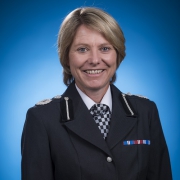Blog | International Day Against Homophobia, Biphobia and Transphobia 2023 – DCC Vanessa Jardine
It’s easy for the police to talk about hate crime. It’s all hypothetical and ‘just another’ crime category, isn’t it? Sadly not.
There’s no official statistics on this but I strongly suspect that almost all LGBTQ+ officers and staff, will have been a victim of hate whether in their personal life or as they make an arrest, manage a call for service or process a detainee. And its important people know this. They need to know that policing really understands the impact these crimes have and how hard it can be to speak out – because it is and I should know.
Like most LGBTQ+ people in policing reading this, I too have been a victim of homophobic hate. Even now, many years later, it’s still really hard to deal with. Hate can take many forms and can range massively in severity, but even the seemingly minor can have a lasting effect. They eat away at our self-esteem as offenders target the heart of our self-identity. And that personal impact matters.
Of course, LGBTQ+ people aren’t unique in this. People who are disabled, who hold faith-based beliefs and who are black, Asian or who are from another minority ethnic groups will have suffered too. But I’m focussing on LGBTQ-related hate as 17 May marks International Day Against Homophobia, Biphobia and Transphobia (IDAHBT). That and I’m the national lead for LGBTQ+ issues in policing.
Some people may think that hate crimes aren’t real crimes, that it’s just ‘woke’ nonsense. But they are real crimes and we’ve focused on them for many years now. They have a real impact and deserve our time to investigate on a scale proportionate to the offence.
IDAHBT highlights how – in the 21st century – LGBTQ+ people are still being targeted because of who they are and who they love. That’s not OK.
LGBTQ+ people are a reality. We exist and we deserve to be able to live our lives, just like everyone else. This isn’t’ special treatment’ – it’s the law! But how do we get people – including colleagues – to report hate crimes?
I know that reporting homo, bi or trans-phobic hate crime can be hard, especially if you’re not out. Fortunately, policing is used to this and we have a legal responsibility to keep personal information safe. There’s also lots of organisations including staff networks, who can support you every step of the way and who can explain your options. Those options can include the punishment the offender receives which can range from letters of apology and other restorative justice approaches, to lengthy jail terms for major crimes.
The charity Galop is a national policing partner. They provide helpline services for LGBTQ+ victims and survivors of abuse and violence. Their research shows that three in five LGBTQ+ people have experienced a hate crime.
Like other crimes concerning vulnerability, it’s really important that victims have someone else to turn to other than the police to report incident and get specialist support. That’s because growing global research shows that lots of minority groups – including LGBTQ+ people – have lower levels of trust and confidence in policing than people from majority groups. There’s lots of reasons for that and raising the LGBTQ+ community’s trust and confidence in policing one of my long term aims.
So remember, hate crimes are real crimes. They matter to you and they matter to policing. Please report them and encourage others to do so too.
Deputy Chief Constable Vanessa Jardine is the National Police Chief Council lead for LGBTQ+.
You can find out more about Vanessa in her profile here.



